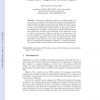Free Online Productivity Tools
i2Speak
i2Symbol
i2OCR
iTex2Img
iWeb2Print
iWeb2Shot
i2Type
iPdf2Split
iPdf2Merge
i2Bopomofo
i2Arabic
i2Style
i2Image
i2PDF
iLatex2Rtf
Sci2ools
127
click to vote
EWCBR
2008
Springer
2008
Springer
Conservative Adaptation in Metric Spaces
Conservative adaptation consists in a minimal change on a source case to be consistent with the target case, given the domain knowledge. It has been formalised in a previous work thanks to the AGM theory of belief revision applied to propositional logic. However, this formalism is rarely used in case-based reasoning systems. In this paper, conservative adaptation is extended to a more general representation framework, that includes also attribute-value formalisms. In this framework, a case is a class of case instances, which are elements of a metric space. Conservative adaptation is formalised in this framework and is extended to -conservative adaptation, that relaxes the conservativeness. These approaches to adaptation in a metric space transform adaptation problems to well-formulated optimization problems. A running example in the cooking domain is used to illustrate the notions that are introduced.
Automated Reasoning | Conservative Adaptation | EWCBR 2008 | Metric Space | Transform Adaptation Problems |
Related Content
| Added | 19 Oct 2010 |
| Updated | 19 Oct 2010 |
| Type | Conference |
| Year | 2008 |
| Where | EWCBR |
| Authors | Julien Cojan, Jean Lieber |
Comments (0)

